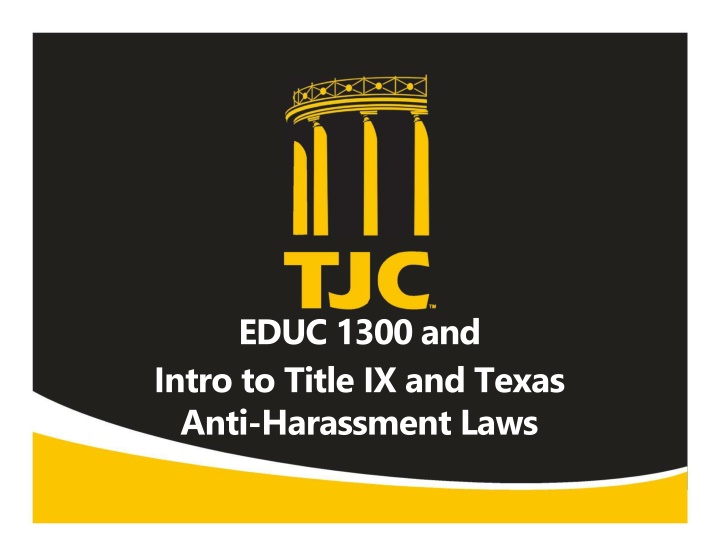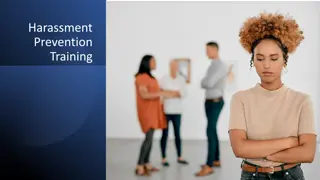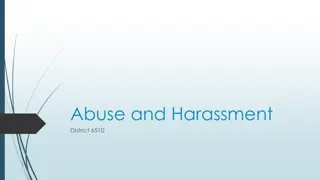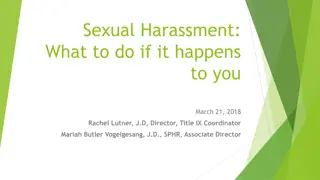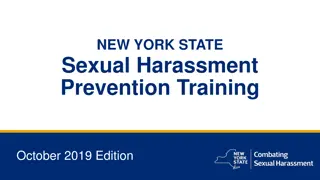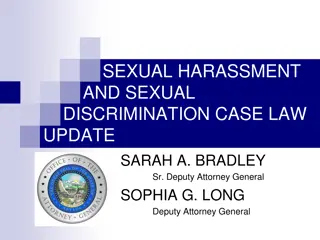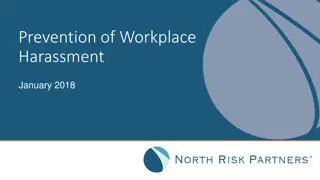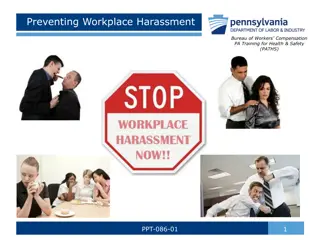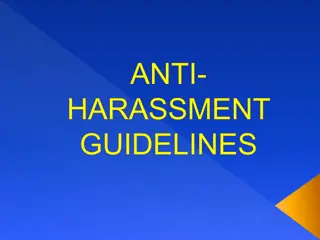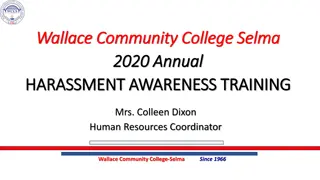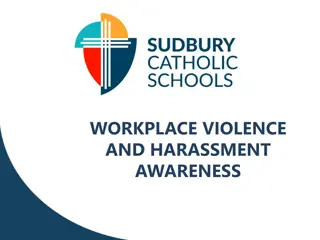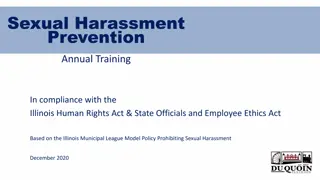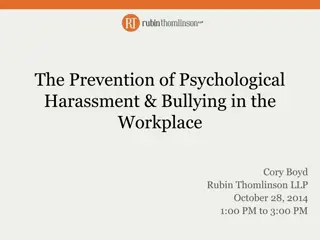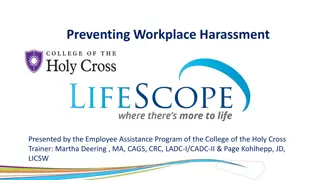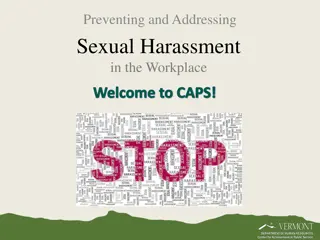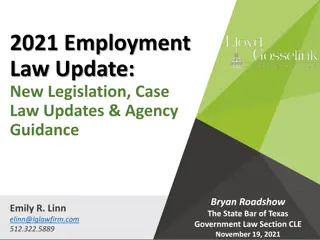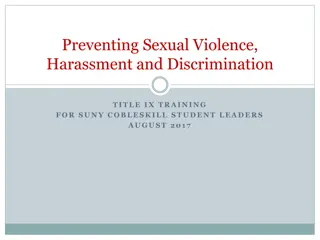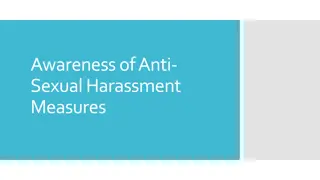Overview of Title IX and Texas Anti-Harassment Laws at Tyler Junior College
This content provides an overview of Title IX requirements, Texas anti-harassment laws, and policies at Tyler Junior College. It covers the scope, compliance, and resources related to sexual violence and discrimination, emphasizing the importance of Title IX in preventing harassment and ensuring equal opportunity in education.
Download Presentation

Please find below an Image/Link to download the presentation.
The content on the website is provided AS IS for your information and personal use only. It may not be sold, licensed, or shared on other websites without obtaining consent from the author.If you encounter any issues during the download, it is possible that the publisher has removed the file from their server.
You are allowed to download the files provided on this website for personal or commercial use, subject to the condition that they are used lawfully. All files are the property of their respective owners.
The content on the website is provided AS IS for your information and personal use only. It may not be sold, licensed, or shared on other websites without obtaining consent from the author.
E N D
Presentation Transcript
EDUC 1300 and Intro to Title IX and Texas Anti-Harassment Laws
Andrew Cantey Director, Employee Relations, Governance and Compliance, Human Resources Title IX Coordinator Tyler Junior College 1327 South Baxter Avenue Tyler, TX 75701 Telephone: 903-510-2186 Email: acan2@tjc.edu
Overview of Policy This training is intended to comply with requirements of: -Title IX of the Education Amendments of 1972; -the reauthorized Violence Against Women Act; -the Jeanne Clery Act; -guidance documents on Title IX issued by the Department of Education s Office for Civil Rights; and -the White House Task Force to Protect Students from Sexual Assault -Texas Education Code Chapter 51; -Texas Senate Bill 212; -Texas House Bill 1735
Sexual Violence Policy Training Sexual Violence and Sexual Misconduct Webpage Pleasereferto TJC sTitle IX webpages: https://pol.tasb.org/Policy/Code/1076?filter=DIAA For a complete description of definitions, contact information, reporting guidelines and resources for victims of sexual misconduct. https://pol.tasb.org/Policy/Code/1076?filter=FFDA http://www.tjc.edu/TitleIX https://www.tjc.edu/info/20017/consumer_information/14/title_ix/4 https://www.tjc.edu/info/20017/consumer_information/14/title_ix/2 https://www.tjc.edu/info/20017/consumer_information/14/title_ix/3 https://www.tjc.edu/downloads/20017/consumer_information Complaints may be filed here file:///C:/Users/A00419909/Downloads/complaintformTIX_2 2_.pdf
Title IX No person in the United States shall, on the basis of sex, be excluded from participation in, be denied the benefits of, or be subjected to discrimination under any education program or activity receiving Federal financial assistance. Title IX of the Higher Education Amendments of 1972 20 U.S.C. 1681 & 34 C.F.R. Part 106
Title IX and State Law Prohibits Rape, Sexual Assault, Dating/Domestic Violence and Stalking Sex Based Discrimination Sexual Harassment
Title IX Applies TO ALL STUDENTS AND EMPLOYEES TO ALL PROGRAMS AND ACTIVITIES OF THE COLLEGE BOTH ON AND OFF CAMPUS (AS LONG AS OCCURS IN U.S.)
What Does Title IX Require? Once a school has actual knowledge of sexual violence or harassment involving student or employee occurring in a program/ activity of the school Reported to Title IX Coordinator or official with authority to initiate corrective measures Triggers response obligation
Formal Complaint A student complaining of sexual harassment must file a formal complaint (in person or online) with the Title IX Coordinator. https://www.tjc.edu/downloads/file/30/title_ix_complaint_form This should be done as soon as possible. A school s duty to investigateis not triggered until a formal complaint is filed.
Sexual Harassment 1. A school employee conditioning an aid, benefit, or service of the institution upon a person s participation in unwelcome sexual conduct (often called quid pro quo harassment); or 2. Unwelcome conduct that a reasonable person would find to be so severe, pervasive and objectively offensive that it denies a person equal access to the school s education program or activity, or 3. Any instance of sexual assault dating violence, domestic violence, and stalking.
Sexual Violence Policy Training Definitions: Affirmative Consent Consent is: Words or actions showing clear, knowing and voluntary agreement to engage in a specific sexual activity during a sexual encounter; or An affirmative, unambiguous, and voluntary decision given by clear actions or words Consent is also: Saying Yes with both your body and words; Given while sober; and Clearly communicated. Consent May Not be inferred from: Silence, passivity, or lack of active resistance alone A current or previous dating or sexual relationship Sex without consent is sexual assault. Use of force, intimidation, or coercion is a denial of a person s right to freely give his or her consent. Even if someone has agreed to engage sexually, that person has the right to withdraw their consent at any time. Incapacitation An individual who is incapacitated by alcohol and/or drugs, both voluntarily or involuntarily consumed, may not give consent.
Gender-Based Harassment Gender-based harassment is verbal or physical conduct that denigrates or shows hostility or aversion toward an employee, student, or group of employees or students because of their gender and that is so severe, persistent or pervasive that the conduct limits or denies the student s ability to participate in or benefit from the College s educational program oractivity. Harassing conduct includes epithets, slurs, negative stereotyping; threatening, intimidating, or hostile acts that relate to gender; and written or graphic material that denigrates or shows hostility or aversion toward an individual or group because of gender that is placed on walls, bulletin boards, or elsewhere on CollegeDistrict premises orthat is circulated intheworkplace.
Domestic and Dating Violence Violence committed by a person who is or has been in a social relationship of a romantic or intimate nature with the victim. The existence of such a relationship shall be determined based on the reporting party's statement and with consideration of the length of the relationship, the type of relationship, and the frequency ofinteraction between the persons involved in the relationship.For the purposes of this definition, dating violence includes, but is not limited to, sexual or physical abuse or the threat of such abuse. Dating violence does not include acts coveredundertheCleryActdefinitionofdomestic violence.
Stalking Engaging in a course of conduct directed at a specific person that would cause a reasonable person to fear for the person's safety or the safety of others or suffer substantial emotional distress. For the purposes of this definition: 1. Course of conduct means two or more acts, including, but not limited to, acts in which the stalker directly, indirectly, or through third parties, by any action, method, device, or means, follows, monitors, observes, surveils, threatens, or communicates to or about a person, or interferes with a person's property. 2. Reasonable circumstances and with similar identities to the victim. person means a reasonable person under similar
Sexual Violence As defined by OCR, sexual violence refers to physical sexual acts perpetrated against a person s will or where a person is incapable of giving consent (e.g., due to the [person s] age or use of drugs or alcohol, or because an intellectual or other disability prevents the [person] from havingthe capacityto give consent).
Bystander Intervention Safe and positive options that may be carried out by an individual or individuals to prevent harm or intervene when there is a risk of harm, dating violence, domestic violence, sexual assault, or stalking. Bystander intervention includes: a.) recognizing situations of potential harm; b.) understanding institutional structures and cultural conditions that facilitate violence, overcoming barriers to intervening, identifying safe and effective intervention options, and taking actions to intervene. The most basic and best action an active bystander can take is to call Campus Police or local law enforcement at 911. Additional ways to be an active bystander, include: Being vigilant by watching out for your friends and fellow students or employees If you see someone who is too intoxicated to consent, enlist their friends to help them leave safely Intervening and asking if a person needs help (e.g., Do you need a ride? or Do you want me to call Security or the police? ) Confronting people who seclude, hit on, and try to make out with, or have sex with people who may be incapacitated. Speaking up when someone discusses plans to take sexual advantage of another person. Believing someone who discloses sexual assault, abusive behavior, or experience with stalking. Encouraging victims to self-report; Refer people to on- or off- campus resources listed in this document for support in health, counseling, or with legal assistance.
ACTION A. Aware Be aware of the event and understand that you need to help. C. Create Create possible solutions. Evaluate alternative courses of action. T. Take your time/Think it through/Tag team Take your time and think your response through so that you do not escalate the situation.Is the situation an emergency requiring direct intervention, or can you discuss at a later time? Take a deep breath and stay calm. Enlist help if you can by publicly stating your intention to help. More often than not, people are as worried about the situation as you are, but aren t willing to be the first one to speak up. I. Intervene Intervene in the situation as soon as it is safe to do so. At the very least, speak up. A conversation will help determine if an ambiguous situation requires help. O. Open dialogue/Observe options Key to creating an open dialogue is to remember your audience, the timing, location, tone and why you are having the conversation.Try to understand others' points of view. N. Negotiate Solution/Negate further conflict Help negotiate a solution.Tell your friend what behavioris or is not acceptable, and know the appropriate next step if you feel the discussion failed to yield a desirable outcome.
Bystander Effect Phenomenon in which someone is less likely to intervene in a problem situation when others are present. People act 80% of the time when alone 20% of the time when others are present
Steps to Intervention Notice the event Consider whether the situation demands your action Decide if you have a responsibility to act Choose what form of assistance to use Understand how to implement the choice safely
Types of Interventions Say something to a friend Interrupt the situation Comment on a Facebook status Distract from the situation Redirect Tell an RA Call the police Tell someone of authority
Retaliation TylerJunior College prohibits retaliation againstanyperson for making an internal or externalcomplaint of prohibited conduct, forassistingin makinga complaint, for resistingoropenly opposing such conduct, orforotherwise using orparticipating in the investigation process. Prohibited retaliation includes: threats;intimidation; reprisals; harassmentor misconduct; slanderand libel; and adverseactions related to employmentor education. Retaliation can be committed by individuals orgroups,including friends,relativesor other associates of the accused. Retaliation, even in the absence of proven prohibited conduct in an underlying complaint, is a violation thatis justasseriousas the main offense.
Who are the Responsible Employees at the College? All employees (other than Confidential employees)
Support Measures Even if you do not want to file a formal complaint, you are entitled to free support measures (such as counseling). You can contact the Title IX Coordinator regarding receiving these support measures.
Reporting to the Title IX Coordinator TJC s Title IX Coordinator is: Andrew Cantey You can contact the Title IX Coordinator by: Phone: Email: Address: 903-510-2186 acan2@tjc.edu Tyler Junior College 1327 South Baxter Avenue Tyler, TX 75701 You can report sexual harassment at any time (24/7) to the Title IX Coordinator in person, by mail, telephone, or by email using the contact information above. This information is also available on the website at: [insert link here]
Confidentiality If you file a formal complaint, or are a witness, your identity will be confidential to the public, but will be revealed to those necessary to carry out an investigation under Title IX.
Treatment A victim of sexual harassment, sexual assault, dating/ domestic violence or stalking should go to a hospital or seek medical treatment as soon as possible and preserve evidence to the extent possible.
Reporting to Law Enforcement A victim of a sexual crime has a right to choose whether to report the crime to law enforcement, to be assisted by the College in making such a report, or to decline to make such a report.
Confidential Employees These persons are designated as employees who students can speak confidentially about prohibited conduct, and they will not disclose the communication unless you consent in writing: Tracey Williams, Counselor 903-510-2041 or twil@tjc.edu Brandi Pate, NP 903-510-3862
Rights A victim of sexual harassment, sexual assault, dating/ domestic violence or stalking has a right to report such incidents to the College and receive a prompt and equitable resolution.
Title IX Anonymous Reporting Hotline 903-533-5599 Instances of sexual assault or sexual harassment may be reported anonymously. The following information will assist in conducting the investigation. Date, time and location of incident Date you became aware of the incident Name and contact info of victim (if comfortable sharing) Name and contact info of the accused Detailed description of the incident Names of potential witnesses 911 should be used for all emergency situations.
Andrew Cantey Director, Employee Relations, Governance and Compliance, Human Resources Title IX Coordinator Tyler Junior College 1327 South Baxter Avenue Tyler, TX 75701 Telephone: 903-510-2186 Email: acan2@tjc.edu
